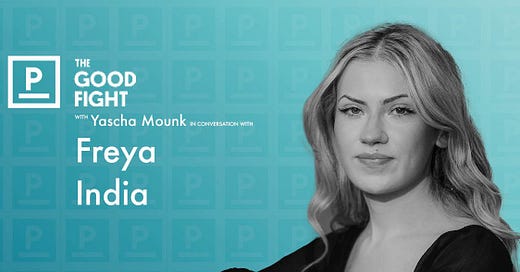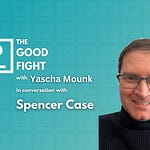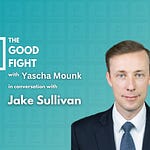Today, we’re taking a break from election coverage and publishing a conversation with Freya India, whose excellent writing we find critical to the broader conversation around social media and the health and well-being of young people today. We have a lot more to say about Tuesday’s result, but in the meantime, please be sure to check out our special election episode of the podcast with Francis Fukuyama.
As always, the best way to make sure that you don’t miss any of these conversations is to subscribe to The Good Fight on your favorite podcast app.
If you are already a paying subscriber to this Substack or Persuasion, this will give you ad-free access to the full conversation with Freya, plus the exciting bonus episodes we have in the works! If you aren’t, you can set up the free, limited version of the feed—or, better still, support the podcast by becoming a subscriber today!
Freya India is the author of the Substack GIRLS. She is also a staff writer for Jonathan Haidt’s Substack After Babel.
In this week’s conversation, Yascha and Freya discuss the great sense of social isolation and anxiety felt by so many young people; why the life lived online is a shoddy substitute for the real thing; and how the difficulties ascribed to social media addiction among young people often can be traced to a broader desire for wisdom and meaning.
The transcript and conversation have been condensed and lightly edited for clarity.
Yascha Mounk: You're a young writer based in Britain. I've been enjoying your writing on Substack and you now work with my good friend Jon Haidt as well.
Jon has been making the argument—on this podcast and in many, many other forums—that there's something really concerning about social media, in terms of things like the rates of mental illness for young people, and young women in particular. But you're able to speak to this in a much more personal way about what it feels like living in a generation that from the beginning was immersed in social media.
Going beyond the statistics, what do you think the problem with social media is to your generation? Why do you feel that that is so fundamentally shaping, and misshaping, how young people lead their lives today?
Freya India: As you say, Jon really opened the conversation to talk about this. He really provided the research and statistics, the foundation for people to come along and give their personal stories. So I'm hugely grateful to him for doing that. I think statistics can be powerful, but they don't convey the emotion of growing up in this era and the unique challenges young people are facing. I wanted in my writing to emphasize the pain of social media, especially as you're growing up as an adolescent girl and handling all of the stresses, the inner angst of adolescence, and then what this does to amplify it.
I think the biggest kind of sentiment I want to get across in terms of what social media is doing is this sense of loss, that my generation has lost something. Love has completely changed. Friendship has completely changed. Social media creates the illusion that you're in touch with people; you see people posting their Instagram stories, you see their relationship updates and it provides people with this sense that they're connecting and they're interacting even though, really, it's somewhat of an illusion. And people didn't anticipate the extent to which people would forfeit the real world for these online connections, especially young people who haven't really grown up with a real sense of community. A lot of them haven't grown up with real deep friendships. They haven't known the alternative. And so when you provide them with these online communities, online friends, it might seem like a great thing. But, unfortunately, they compare that to the real world, which is full of friction, of rejection, and the social anxiety that comes from that. The online world seems much more compelling. I think we underestimated the extent to which people would choose that over reality.
Mounk: So tell me why it induces that form of isolation. I know that there are striking statistics that the average 16 or 17 year old just spends much less time hanging out with their friends than they did even in my generation, and even more so compared to Jon's generation. One thing in particular that always strikes me is the demise of the phone call, which is not nearly as good as hanging out in person, but it's a lot better than sending texts or looking at each other's pictures on Instagram.
How is it that the existence of these social media apps has changed the dynamics in such a way that hanging out in person has been crowded out?
India: I think it is actually a choice they're making but it's more subconscious. I think what's actually happening is in previous generations if you felt lonely, that loneliness would be a signal and you would feel it and it would force you to go and do something about it. Whereas now I think young people feel loneliness, they feel this need to go and connect socially and they can just kill it. They can numb it by watching a YouTube video or scrolling through Instagram, or keeping up with the influences they follow, and they can simulate this social interaction. So we've got young people who are eating dinner with YouTubers. The YouTubers are eating their meals and talking about their relationship drama and their personal life and they're simulating friendship. That's going on on Instagram, it's going on on YouTube. They have all of these kinds of platforms providing this fake connection.
As I said, what that does is it numbs the loneliness. So the loneliness is not strong enough for you to then feel like you need to go out and again, take on the kind of energy and effort that that requires to go and meet a friend. So I think for young people now, they have the fake social connection, which is extremely convenient and accessible. They have an ambient sense of kind of loneliness and disconnection, but it isn't so much that it forces them to go out.
I think that's the real problem of social media: especially lately, you see all of these new apps that are going to solve the loneliness epidemic or the metaverse is going to solve it or, and you know, these are promises to solve loneliness that come on a screen or are downloaded from an app store. And all they're doing is just distracting us from doing something about the problem, which is going out and hanging out with each other. So I think that's the real problem here.
Mounk: This sense of loneliness might act as an indicator that you need human connection, but if you can just numb it in a way that acts as a sort of simulation of meaningful human connection, then you might never feel that absence enough to really act on it—until, perhaps, you have some mental health problems, which might act as another barrier.
How have you experienced this kind of rise in social anxiety? Do you think that that is a genuine generational difference?
India: Yeah, it's funny because I always think about how there's all these young people who say they have social anxiety and I really believe that they do. But they'll be comfortable talking about it on TikTok. So if you go on TikTok, “#socialanxiety” has billions of views and there's young people saying to the camera how scared they are of talking to people. They're filming themselves trying to make a phone call and they're shaking. They can't answer the door to a delivery person because they're that anxious, but they're recording it. It's become kind of a status symbol and it's even stranger that they're comfortable talking to people they don't know online, potentially millions of people, but they're not comfortable making eye contact with someone in the street. So there's something really tragic going on there.
I think a big part of it is young people have grown up on social media, in worlds that they can very much control: If you're going to flirt with someone, you can just send an Instagram DM. You can rehearse it. You can make sure it's perfect. You can agonize over it. You can check it with ChatGPT to make sure it sounds normal. So when it comes to making a phone call and that's live, there's a lot of anxiety, because we've grown up with a lot of control and predictability over these things. And we can also block people on social media. We have all these ways of manipulating the interaction. And then when it comes to real life, it feels terrifying because we've been raised with less face-to-face interaction than any other generation.
I'll just casually mention an example of a TikTok I've seen or something, and older generations will look at me like it's crazy. On some of the mental health TikToks online, there's predominantly young women sharing things like live streaming their panic attacks or revealing these really deep dark traumas while they're doing their makeup. And it's kind of normal to me because I've grown up with people being this vulnerable online and you know young people scroll through this kind of thing like it's mindless content. But you mention it to older generations and they can't really conceive of sharing something that personal with so many strangers. For young people it's happened very, very gradually. I remember when I was maybe 13, 14, the first kind of cohort of YouTube influencers were talking about their mental health and they would just say things like, “By the way, guys, I have anxiety. It's nothing to worry about.” And that felt like a healthy message. But over the years, I've just seen it escalate and escalate where it's gone from being more vulnerable with your audience to monetizing that, maybe trying to sell your audience a therapy discount code. We're used to this level of disclosure and I don't think many young people see that as worrying, or a sign that you might be lonely. It’s just what existence is. You exist and you also perform it to an audience at the same time.
Mounk: I want to distinguish for a moment between two different phenomena: one is the tail end of those kinds of influences, the people who have had some amount of success with this, who have it either as a career or as just a significant portion of what they do with their lives. And I think for obvious reasons, that can be very pernicious, particularly in a space like mental health.
Putting aside the influencers for whom this really is a very large part of their lives, what does the interaction of social media now look like for the average person in your social circle, in your generation, who presumably does have a TikTok or Instagram account. For the average person, what does that experience look like and why should we worry about that average person as opposed to the more extreme cases?
India: Well, I think the trouble is the average person is scrolling through those extreme cases all day, every day—not to say that all young women are live streaming their panic attacks, but a live stream of a panic attack on TikTok is getting billions of views. My concern is they're scrolling through the most extreme content because the algorithm is obviously feeding them what gets the most engagement, so they tend to see the most extreme discussions of mental health, the most extreme beauty images. Whatever vulnerability they have, they're probably being exposed to the most extreme content around that. So I think for the average young girl, her experience of social media is increasingly becoming scrolling through influencers who are looking to sell her something, adverts from companies and people who are incentivized to transport girls to the most dark and extreme end of some of their fears and insecurities. So if you're just a normal young girl, for example, who doesn't like how she looks, maybe you don't like your lips and you're on Instagram, your experience is becoming less and less scrolling through posts from family and friends. It's now becoming the most extreme influencers who've had the most amount of lip filler who are live streaming themselves going to get lip filler, giving tips of where to get lip filler. Then you're getting ads based on that. If you hover over something for half a second because it makes you feel insecure, you look at it slightly longer and the algorithm will log that and serve you more of it. I call out the extreme influences because I think they're warping the world view of ordinary girls and young women and telling them that this is normal.
Souhaitez-vous - ou quelqu'un que vous connaissez - avoir accès à tous ces articles et conversations en français ? Cliquez sur ce lien et activez “en français” sous Notifications ! 🇫🇷
Mounk: I want to get to what we might want to do about that as a society, but to start off with, what are you doing about it, personally? Are you off social media completely? What kind of advice would you give people for what consequences to draw from this in their personal lives?
India: I'm not on social media (as in, nothing about my personal life). So I only have Twitter and Substack. And I make the firm distinction between commodifying your personal life and commodifying your work. I think if you're a young person and you're creative, social media is great and it's an excellent way to share your work with the world. But it's a very fine line between selling what you're working on and selling yourself.
I don't share any personal updates. I don't take any selfies. I don't engage in any of that because that's all been terrible for my mental health, but I will share my work and then just kind of leave it. But increasingly I'm thinking that even that is kind of an illusion as well, that you have to be on social media to be a writer. I think Substack is becoming a little bit more like social media now, but you can get away with not posting or tweeting your articles. I think if you really care about the craft and you put work into that, maybe you don't necessarily need to be plugging yourself on social media as much as we might think you need to. I've definitely changed my opinion, though, because even just a year or so ago I would say there's some girls who can scroll through Instagram and feel fine, so they should be allowed to stay on it. I'm not telling anyone to get off. But I think the longer I've been writing about these things the more now I'm much more firmly on the side of the only answer is to delete it.
Mounk: One way of thinking about this is that the social media platforms are filling a need that other elements of our lives are not. Perhaps part of it is that we're not pursuing those needs in these other ways because social media sort of substitutes for them, right? But I increasingly get the sense in your writing that you're starting to think about a lack of moral direction and a lack of orientation for how to live in the broader culture.
How do you think those two things relate? Is it that somehow people in your generation have less moral guidance, less of a sense of a meaningful pursuit or career that then leads them to also crave this simulacrum of human connection? Which way around is the causality going? Is it the rise of social media that makes people desist from those pursuits? And what might that mean for how to build a healthier society?
India: I definitely think this is a much bigger problem. There's a lot of cultural forces and trends that were kicking into gear decades before social media, which kind of primed this generation to be the perfect victims for it, I think. I tend to look at social media trends and then try and think about what it is that young people are looking for in this trend. For example, I was looking recently at the amount of young people trying to get relationship advice online. They're watching influencers, dating gurus and relationship experts, and they're learning about how to set boundaries, and they're learning all of this therapy speak. This kind of relationship content gets millions of views, it's extremely popular. But when you kind of strip back what's happening there, young people are looking for wisdom, they're looking for guidance on how to have a relationship. They're craving some kind of structure for how to orient themselves in their lives. And so I think all of the trends that young people get obsessed with online, you can trace it back to some kind of need that's not being met here.
Older generations now tend not to give advice about relationships. I get the sense that most older family members kind of step back and they want their children to grow up and meet someone and make that decision themselves, but it's quite anxiety-inducing to do that. And so you see all of these kinds of young adults online desperately looking for advice, is this a red flag? Should I avoid this? What's acceptable and unacceptable in a relationship? And I went through all of these kinds of online forums of young adults getting so muddled and confused online. And I think they're looking for adult guidance. And now I see that everywhere. I see a very lonely generation who are opening up on TikTok, live streaming their panic attacks to get sympathy and attention, which tells me they don't have people in their lives giving them sympathy and attention. So something's happening to friendship, something's happening to family. That all started before social media but have made this generation the perfect consumers for it.
Mounk: I think this sort of thing comes up every time people talk about Jordan Peterson. And I've made this point, I think, once or twice before in the podcast: it feels to me that his success is our fault. And what I mean by that is that he stepped into a huge void, perhaps particularly in his case, for young men who didn't have much orientation from their families or their cultural context. There wasn't really anybody offering them advice about what a worthwhile life is and how they should live and so on. And I have some misgivings about the particular advice he gives and his particular persona, but he was somebody who was willing to step into that void. And so rather than blaming him for stepping into that void in a way that we might have some bones to pick with, we should be asking ourselves why nobody else is willing to play that role. Perhaps the best explanation for why people don't want to do that is that they have the sense that the moment they start giving advice, it can easily become lecturing, or hectoring, or oddly old-fashioned.
How do you think we can fill that space? Is it just giving permission to family members to actually talk to each other in a different way? Is there also public writing of a different form we need? And how do we make sure that this advice hews to some of the basic and reasonably timeless truths about the importance of having strong relationships?
India: Yeah, it's funny, we call it lecturing and moralizing now, but I think we used to call it wisdom. We used to really respect the kind of wisdom our ancestors left for us and what the older people in society were telling us. Now, it's flipped: I feel like adults want to be their kids' best friend. They want to be cool. They don't want to seem extremely out of touch. They either try to talk like young adults do and just agree with everything they say, or they don't get involved. They just kind of step back and say, “I don't know this world.” But as you said, I think the guidance we're looking for is age-old wisdom, a lot of the time. And I think adults need to be more empowered and confident to say it, because these are lessons people learn as they grow older. Of course, everyone's going to have different opinions, but things like the value of relationships, the value of connecting with people—there aren't many people who disagree with that. But you have a lot of teenagers and young adults now who are saying, “I don't want a relationship. I'm never going to get married. I don't want to have children. I'm not even going to have that conversation. I don't see any benefit to it. I see it as completely inconvenient and irrational.” And those can be valid choices, but I think sometimes they're informed by this complete lack of guidance and complete lack of positive examples from adults in your life. And we now think it is kind of obsolete because we're in this new world, but it's not obsolete. It's actually needed more now than ever.
Möchten Sie meine Artikeln und Gespräche auf Deutsch direkt in Ihre Mailbox bekommen? Klicken Sie diesen Link und schalten Sie unter Notifications “auf deutsch” an! 🇩🇪
Mounk: What's your response to people who would listen to all of this and think “that's all really interesting and seems persuasive. But then when you step back and you look at what people were saying 25, 50, or 75 years ago, there's always these concerns about the youth. And there's always been concerns, in particular, about how children are growing up”?
How do you respond to people who listen to all of this and say, “Look, know, perhaps what we're talking about is just the modern, contemporary form of problems that people have had before. Perhaps people talk a lot more now about mental health, so even some people who don't have genuine mental health challenges speak in that register. But there's always been a lot of people who've been depressed. There's always been a lot of people who felt some amount of social anxiety. There's always been a lot of people who've had trouble finding a partner or who felt that life lacked meaning.” How do you respond to them?
India: Well, I agree with that, in part. I do think a lot of this is age-old anxieties, especially adolescent anxieties. But my main point is that these anxieties that have always existed are now being directly targeted and exploited by companies and industries and amplified to a level which they previously weren't and are now unmanageable because they're extremely personalized. So if you're a 15 year old girl with those age-old anxieties about how you look and you feel insecure and you feel lonely, now you have companies that can monitor your behavior online, they can log those insecurities and then use them against you. They can sell them to advertisers who can then target you.
I would just point them in the direction of Jonathan Haidt's work, at the actual statistics, which are harrowing. He did a piece recently showing that across the five Anglosphere nations, suicide rates for girls and young women are the highest on record. And you look at the jumps in self-harm, in eating disorders, girls kind of starving themselves into the hospital—these aren’t trivial numbers. There is something going on since 2010 which is different and that's what all my work ties back to. A lot of it is age-old anxieties but again they're being exacerbated to a point now where I think the average young girl just cannot cope. That's what worries me. There are billion dollar industries going after them now.
In the rest of this conversation, Yascha and Freya discuss whether there is a gender gap in how young people manage the difficulties associated with social media. This discussion is reserved for paying members...
Listen to this episode with a 7-day free trial
Subscribe to Yascha Mounk to listen to this post and get 7 days of free access to the full post archives.














